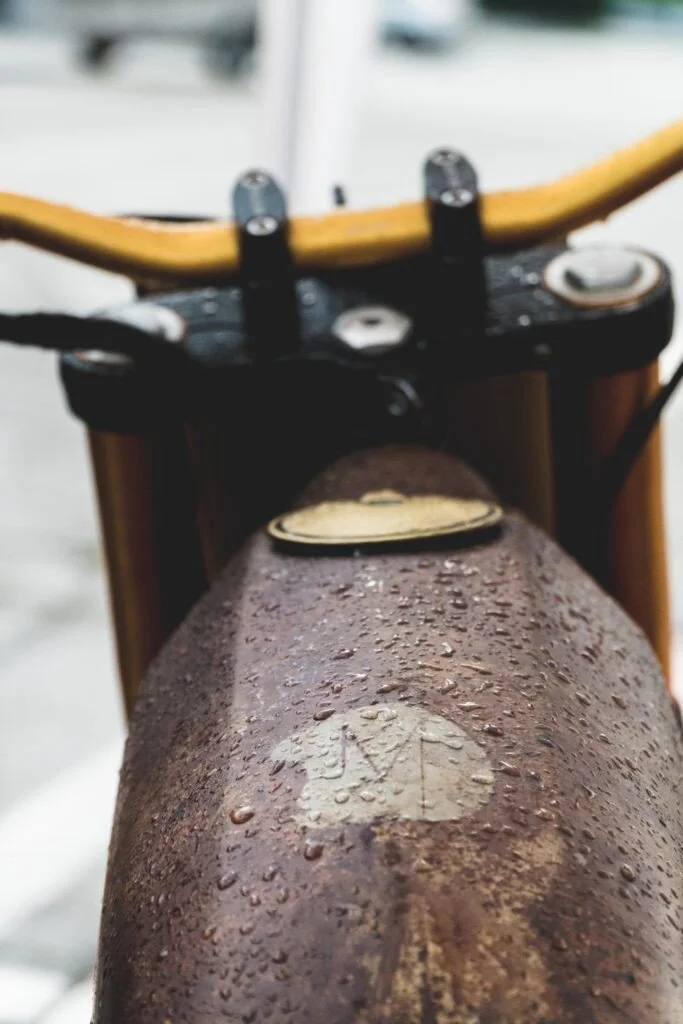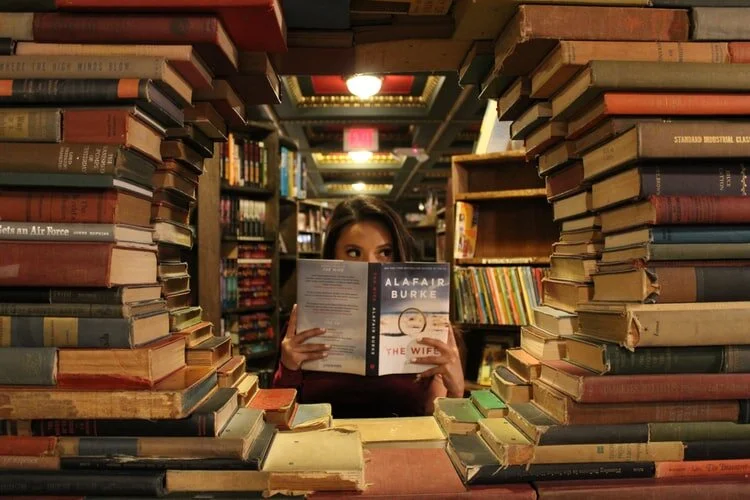A Single-Sentence, 1537 Word, Short Story
Josh Bronson In “Learning How To Die” was originally published by The Sunlight Press
Josh Bronson, 44, salt and pepper hair pulled back, is a quiet man who prefers the solitary company of Camels and Bud over the nonsense of strangers, which is why he chose to work alone in both his professional life — the erection of small town and off-the-beaten-path billboards — and his private life — the robbing of those very same small town and off-the-beaten-path banks — the latter of which, at this very moment, he was in the virgin stages of, pulling behind an unmarked development area, beside a small dirt path that would hide his getaway, under the town’s billboard, a ’60s era Coca-Cola ad of a pin up girl, winking from her high-perch, the words “Thanks Daddy” flowing from her lips with a certain sexual energy that seemed to run against the spirit of a common Coca-Cola ad, to be replaced by an advertisement more akin to the new millennium, a sparkling waterfall with the words “Purpose: Find Yours” written in the billboard’s clouds, a Virgin Airlines logo in the corner, currently rolled up and tucked into the corner of Bronson’s white work van, that same van that held his most prized-possession, his bike, a 1974 Cafe Racer, painted red (he changed the colour with each robbery), which is, as of right now, between his thick workman’s thighs, with the door of his van open, a ramp from the van leading out into the free and open world, a world where the strong, men like him, can mark their claim, take what’s theirs, like a bank, a mere six miles away, and so he turns the key, throttles the ignition, a burst of power bouncing out into the early morning silence of the surrounding red oaks, a stillness not unlike peace weighing heavy on his chest as he puts the bike into gear, rides down the ramp, through the forest, and on to the streets of the town, wearing black coveralls, a balaclava stuffed into its deep double handed pocket, a single strap backpack, custom-built to also hold a shotgun, slung over his shoulder like the sheath of a samurai sword, fashioned to not draw too much attention to itself, a point he tried to carry over into all aspects of his life, that very same point now displayed on his face, a cool burn of solitude and dignity, adding to his untouchable aura, that leader’s burden, as he surges down the main street, passing the town’s only bar, an ill-supplied library, a grocery store running under the banner of Bob’s, and a Chinese restaurant, because every small town has to have one, and pulling right up, over the sidewalk, to the double doors of the plain town bank, slipping the balaclava over his face, placing a hand on the door handle, a strong foot into the entryway, a sword from its sheath, an “Everybody get down!” to the six inhabitants of the town bank — this is men’s work, he tells himself — blood pumping through every ounce of mileage it has to spread, the warmth radiating off his skin, a furnace of fury, moving past a shrieking woman with hair curlers still stuck to her head, as if she fought and lost with a curling cactus, resulting in a single disapproving look from Bronson’s almond eyes peeking through the slits in the balaclava, which gets her to quiet, moving past an old man, the kind of man with a glint of fire, the memories of war, written on his face, the kind that will test you if you give him room to test, moving past a middle-aged woman, first in line, pushing her own child behind her back to cower between unshaved legs, moving past the teller, a short-haired vixen, who Bronson winks and clicks his tongue at, and he’s damn near sure she blushes, before he finds the manager, standing at his desk, hands in the air, telling him to calm down, calm down, calm down, he’ll play along, but Bronson responds only with a stiff arm, the end of which carries his shoulder-slung bag, and the manager knows what to do, not because he’s been here before — he hasn’t, and the closest he’s ever come was when the Stratford boy caused a stink, the result of a missing welfare payment, so he threatened to shoot up the place — but he’s still seen it all before, familiar with the whole gamut, having experienced it through television, or movies, or the late night news, and so, while Bronson looks over his shoulder, brandishing his shotgun, a sign of things to come if anything goes south, the bag goes from empty to full, without anyone having to get hurt, just as he planned, and Bronson walks out of the bank in a minute and fifty-nine seconds, which he knows for a fact is his all-time record, timed on a cheap watch he won in one of those games where you feed it a dollar and it gives you a chance to pick up a prize with a misshapen claw, that very same watch being on his wrist, the time stopping a second shy of two minutes as the Cafe Racer (soon to be yellow) was safely back between his two thighs, pulling away from the bank, back on the street, moving past the usual Chinese Restaurant, Bob’s grocery store, the ill-supplied library, and the town’s only bar, with the police station hidden away on the other side of town, a clear getaway to his van, where he would get out of his black coveralls, replace them with bespeckled painter’s jeans and a blue mickey mouse shirt, with another job behind him, the residual high of adrenaline still in his veins, but up ahead, just out of ear shot, he sees twirling red and blue sirens attached to, at his best guess, twelve or thirteen vehicles, all waiting in ambush, probably, he deduces, in the three or four seconds it takes him to react, a product of an FBI investigation, seeing a pattern of “Bronson Billboards” appearing wherever there was a robbery, and a clear oversight of his, a moment of hubris, thinking that he was uncatchable, untamable, a lion in the wilderness of man, taking the country by storm with a foolproof plan that had no end in sight, no “what ifs” he were caught, no hard and fast solutions, only action, and so he hits the brakes on his bike, down-throttling, turning in the other direction, slow then fast in an instant, pulling away from the cop cars, all of which put their own pedals to the floor, speeding after him, their engines running on modern engineering, his on 1970s glamour, slowly but surely reducing the distance between cop and robber, yet this was all part of the fun, the thrill of being caught, the ecstasy of being knee deep in a chase, blue and red nipping at his heels, threatening to end his freedom with one empty cell, a stiff bed, and nothing more than a pot to piss in, so he grits his teeth and pulls harder on the throttle, pulling away again, but before he can get anywhere, there is another fleet up ahead, with their own set of blue and red, ready to clamp down on him from either side, their sirens screaming get away, get away, get away, but he sees no other options, no way out, and instead of turning around, looking for another path, he recognizes a singular destiny at the other end of their guns, calling out to him to come forward, to spray his fuel into his dual cylinders, to push his tires harder, faster, against the asphalt, which he does, and at that moment, Josh Bronson, learning how to die, diving steadfast into danger, comes to terms with his end, is happy for it, and realizes that everything that came before, every moment of his life, was leading up to right now, a moment of manhood, a single dazzling flame, going out just as he came in, with dignity and daring, a noble lion taken down by the small yipping bites of hyenas, and so he twists his grips as far as they’ll go, the palms of his hands burning against the rubber, the cars in front of him rapidly growing in size and only this is It repeating in a brain now acting only on instinct, but then, there’s a moment of doubt, a feeling of fear, a taste of cowardice, which he would replay, a million times over, for the next twelve years of his life spent behind bars, wondering where the man he knew was, that man who feared nothing, who cared for no one, who hung to life like it was his last day, every day, but that day, that one second, wanting nothing more than to see the sweet taste of tomorrow, so for today, he brakes, lets the bike wobble, and sends himself tumbling down the road, skipping across the asphalt like a flat pebble on water, twisting and turning, the smell of burning skin and cotton and leather in the air, until he rolls, with less skin than dignity, to the feet of the horde of officers, guns drawn and on him, a groaning sack of torn human flesh.
Ian Canon is a novelist, freelance writer, and poet whose debut novel, "It's A Long Way Down" was published in May of 2018 and first poetry collection, "Before Oblivion" was published in April 2017. His second novel, "What We Do On Weekends" will be out in 2020.>> Download his 56-point Checklist To Novel Editing here. << 


